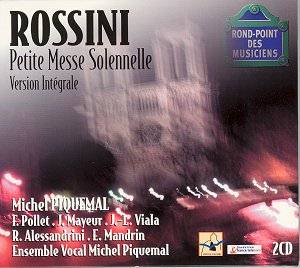Rossini composed his Petite Messe Solenelle
some three years before his death. Well known for his wit, this
work is ironically named, for, at nearly 90 minutes long, it’s
hardly petite! And solemn it is not. In fact the word celebration
often associated with the Mass is literally true here because
in its outward looking joyfulness, sometimes even jollity it really
is a celebration. One might go so far as to think this is an early
example of ‘happy-clappy’ church music. Addressing God, Rossini,
himself, said of it, "King Lord, my poor little mass is finished.
Is it really a mass – or just a mess? I was born for opera buffa,
as you know. Not much skill but a little feeling, that’s all there
is to it. So blessed be Thy Name and grant me paradise.’
But its approachable mixture of sentiment, piety
and humour, so typical of Rossini, has endeared this ‘little’
Mass to ensembles ever since its first performance on 24 April
1865 at the home of the Comtesse Pillet-Will. (It will be remembered
that Rossini had ceased composing operas at the early age of 37
in 1829. For the next 39 years he was in virtual retirement –
he spent the time exploring other musical genres including the
many little pieces for voice and piano that he composed in his
latter years which he referred to as ‘sins of his old age’.)
The Petite Messe Solenelle is scored for
four soloists, two vocal quartets, two pianos (although it appears
that only one is utilised on this recording) and a harmonium.
Thus in this context the appellation, ‘Petite’,
is appropriate for here Rossini is breaking away from the mass-sound
effects of his previous works - and the majority of other Mass
settings. He added an astonishing desideratum – "twelve singers
of three sexes: men, women and castrati". Some hopes. He
must have known that the vogue for this type of singing had passed
with the 17th and 18th centuries but it
would seem that he had a nostalgia for the vocalità which
he had known and loved in his youth, the crystal clear bel
canto that the castrati had perfected before the dawn of
the Romantic Age.
The old fashioned charm of the harmonium adds
an atmosphere of intimacy and spontaneity as though the Mass was
being celebrated in a small chapel by a small community. The music
has a simple directness, its eccentric rhythms, its amusing tempi,
operatic-like tunes, the sweetly sentimental piano solo opening
to the Preludio religioso and the wildly romantic Agnus Dei all
make compelling listening.
Michel Piquemal delivers a tasteful reading.
His performers are sincere and enthusiastic without allowing the
quirkiness and humour to overwhelm the charm and simple piety
of this endearing work.
Ian Lace
